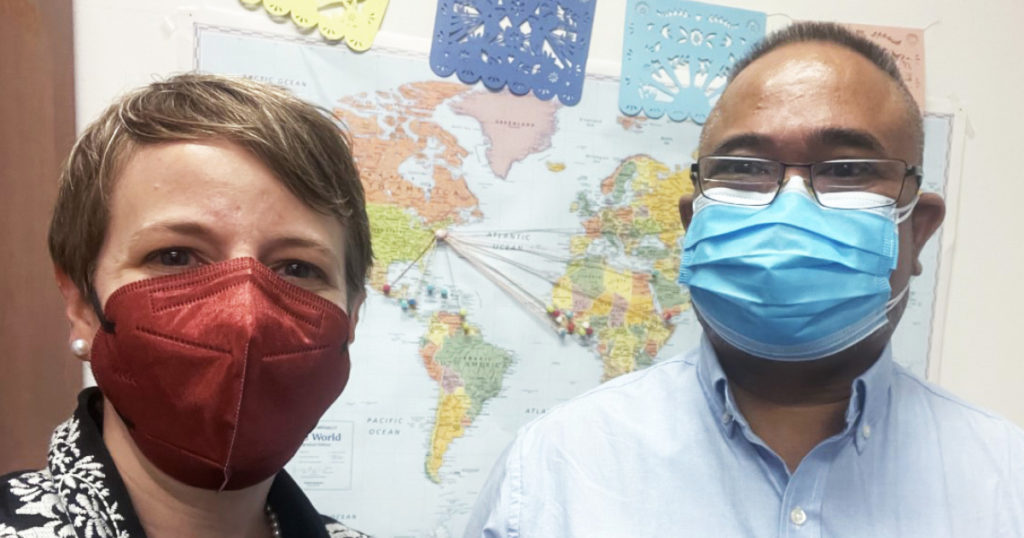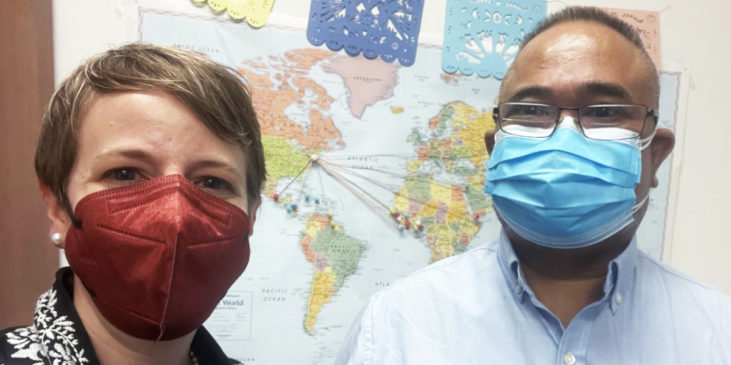
Mr H. is a shy and solitary man—gentle, even. His handwriting is elegant and perfect. His faith leads his life, and he aspires to become a clergy member.
He is in his mid-50s, and for 20 years, he has been fighting to make a new life in the United States. Originally from Indonesia, Mr. H. faced a number of dire challenges to his health and safety in his home country: He has multiple serious medical conditions, he is Chinese, he is devoutly Catholic, and he is gay. Threats and harassment dogged him for his perceived failure to fit into society’s framework. For two decades, he has sought asylum in search of a life free of danger, fear, and hiding.
This year, Mr. H. achieved his goal with the help of the New York Law School Asylum Clinic, including Assistant Professor of Law and Clinic Director Claire R. Thomas ’11; students and alumni Laura Bally-Mahabir ’23, Brandon Dolinger ’22, Kai Wang ’19, Jan G. Arcia ’19, and Alyssa Ramirez ’18; and Professor Lorilei Williams, who supervised the students while Professor Thomas was on sabbatical. The team collectively logged more than 633 hours over the course of their representation of Mr. H.
His labyrinthine journey—which included a revolving door of counsel representing him, arrest, incarceration, deportation, and decades of uncertainty—exposes the many inequities and injustices of the American immigration system.
New York Law School’s Asylum Clinic
In NYLS’s Asylum Clinic, students are trained to represent immigrant clients and argue cases in the Immigration Court before the Newark and New York Asylum Offices. Under faculty supervision, they work on behalf of refugees fleeing persecution and seeking safety in the United States. With help from faculty, students interview and counsel clients; conduct fact investigation and discovery; draft pleadings, correspondence, and motions; perform legal research and analysis; collaborate with social work professionals and country conditions experts; engage with interpreters; and appear with clients before the Immigration Courts and at the Asylum Offices.
Mr. H. filed his first asylum application on his own in 2002. The Asylum Clinic team filed a Freedom of Information Act request to access his original application which was entirely written by hand in Mr. H.’s careful print. In his request, he detailed a lifetime of persecution ranging from being spit on in public to being refused property to threats of violence.
He began going through the immigration court proceedings, eventually engaging a lawyer. His representation failed at every turn, neglecting to see his case through and opting not to update Mr. H. It was during this time that Mr. H. was also able to articulate his gay identity—something that would not have been safe in his home country.
Years went by with Mr. H. in limbo. He received social services thanks to a New York City program, but he needed to pursue his case in order to receive more medical care. He met with Catholic Charities and NYLS alumna Jodi Ziesemer ’13 who helped him achieve deferred action status in 2013. He was required to check in with U.S. Immigration and Customs Enforcement (ICE) every year.
In 2017, Mr. H.’s case took a devastating turn. Despite having no criminal record in any country, he was arrested in a targeted, Trump Administration operation aimed at deporting Indonesian immigrants. He bounced between detention facilities in New Jersey, losing life-saving medication for days at a time with every transfer. He was deported to Indonesia, chaperoned by ICE agents who shackled him, denied him food, and dehumanized him at every turn.
“He’s a small man with thick glasses. He’s not a danger to anybody,” Professor Thomas says.
When Mr. H. arrived in Indonesia, he went into hiding, living in the basement of a church for a year.
Professor Thomas’s colleagues at the African Services Committee fought for Mr. H.’s return to the United States, and he returned in August of 2018, where he was immediately arrested, taken to ICE immigration detention, and was denied his medication for days at a time. He describes being shackled by ICE agents when the plane landed at JFK airport to take him to ICE detention as the most humiliating experience of his life.
In 2018, the Asylum Clinic got involved and visited Mr. H in a detention facility in New Jersey. Then-Clinic student Ramirez prepared a bag of essentials for Mr. H: shampoo, soap, a combination lock for the shelter he’d be going to once he was released.
Ramirez and Professor Thomas prepared and argued his bond motion, working to release him from detention. The bond hearing was challenging, Professor Thomas says.
Still, the team secured his release. A benefactor paid his bond—the minimum for an immigration bond is an often prohibitive $1,500—and Professor Thomas went to New Jersey to pick him up. He had one night before social services would provide him with a longer-term housing option, so Professor Thomas found a shelter near NYLS where he could safely spend the night.
Professor Thomas met him at Newark Penn Station and they headed back to the City together on the PATH train. It was “an emotional ride,” she says. Once back in the City, she asked him how he’d like to get to the shelter: a taxi?
“A walk,” he said. “It’s been a while since I’ve been here.”
Outside—away from confinement—Mr. H. and Professor Thomas walked to the shelter. He stayed the night before moving into a longer-term apartment uptown, where he “just tried to stay safe from Covid, live his life, take care of his medical appointments, and continue his faith practice,” Professor Thomas says.
The Asylum Clinic team continued to work on Mr. H.’s case, facing a wall of resistance when it came to scheduling his hearing.
Finally, in 2022, Professor Thomas and Mr. H. sat together in her office to face the immigration judge in the final part of an online hearing. Testimony had already been taken, and this hearing was to double check that security clearances had been processed. Professor Thomas had prepared her client, and she knew that in this hearing, as long as ICE had processed the security clearances, it would all be over.
The hearing was quick. The judge said “Okay, I wish you well,” Professor Thomas remembers.
“It’s nice, but also totally bonkers after 20 years,” she says.
They closed the computer and Professor Thomas turned to Mr. H.
“Is it over?” he asked.
“Yes.”
“So, we won?
“Yes, Professor Thomas said. “You’ve been granted asylum.”
Mr. H. paused.
“Is it official?”
“Yes.”
“Can the judge change his mind?” he asked. Professor Thomas explained that the judge could not change his mind—and that ICE had waived its right to appeal.
It took a moment to sink in. And then it hit: Mr. H. started crying, and Professor Thomas followed suit.
It was finally over. Mr. H. was home.
After 20 years, Mr. H. is “in disbelief,” Professor Thomas says. To celebrate, he treated himself to breakfast in Chinatown, and he told Professor Thomas he looked forward to a peaceful night’s sleep that night—the first in decades. What awaits him in the morning? A sense of safety long deferred—and hope for a better tomorrow.
Experiential Learning at New York Law School’s Plumeri Center
Experiential learning is an integral part of the NYLS education. The Plumeri Center is NYLS’s home for experiential learning, and the Center houses our many clinics, including the Asylum Clinic. Through our top-tier programs, we offer students the opportunity to turn theory into practice: Starting in their first year, students participate in counseling, interviewing, and negotiating exercises in their foundational Legal Practice course. During their upper-level years, students may select from a wide array of experiential learning courses to hone their lawyering skills. Together with a comprehensive legal education, these experiential offerings prepare our students for careers in advocacy.

